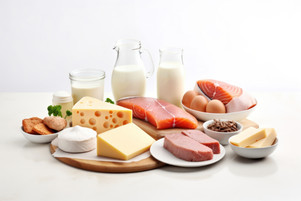Are you feeling tired all the time? Do you struggle to concentrate or remember things? You might be low on Vitamin B12. This essential nutrient plays a crucial role in keeping our bodies functioning at their best.
Let's explore why Vitamin B12 is so important and how it can benefit you.
What is Vitamin B12?
Vitamin B12, also known as methylcobalamin (the active form), is a water-soluble vitamin that's vital for many bodily functions. It's naturally found in animal products like meat, fish, eggs, and dairy. For those following plant-based diets, fortified foods and supplements can be good sources of B12.
Key Benefits of Vitamin B12
- Energy Production—Feeling sluggish? Vitamin B12 helps convert the food you eat into energy your body can use. It's essential for the proper function of your metabolism, helping you feel more energetic and alert throughout the day.
- Red Blood Cell Formation—B12 is crucial for producing healthy red blood cells, which carry oxygen throughout your body.
- Nervous System Support—Your nervous system relies on B12 to function correctly. This vitamin helps maintain the health of nerve cells and even plays a role in producing myelin, the protective covering around nerves.
- Cognitive Function—Having trouble focusing or remembering things? B12 is important for cognitive health. It may help support memory and concentration, potentially benefiting people of all ages.
- Mood Regulation—Some studies suggest that B12 may play a role in producing brain chemicals that affect mood. While more research is needed, maintaining healthy B12 levels might contribute to a more stable mood.
- Heart Health—B12 works alongside other B vitamins to help regulate homocysteine levels in the blood.
- Healthy Pregnancy—For expectant mothers, adequate B12 is crucial for fetal development, particularly for the baby's nervous system and brain. It's often recommended as part of prenatal care.
Who Might Benefit from B12 Supplementation?
While many people get enough B12 from their diet, certain groups may be at higher risk of deficiency:
- Older adults
- Vegetarians and vegans
- People with gastrointestinal disorders
- Those who have had weight loss surgery
If you fall into one of these categories or are concerned about your B12 levels, it's a good idea to speak with your healthcare provider.
How to Increase Your B12 Intake
If you're looking to boost your B12 levels, consider:
- Eating more B12-rich foods like lean meats, fish, eggs, and dairy products
- Taking Premium Mega12 Plus with the dosage on the bottle or as directed by your healthcare professional
Remember, while Vitamin B12 is essential for many bodily functions, it's important to maintain a balanced approach to nutrition. No single vitamin, mineral, essential fatty acid, enzyme, prebiotic, probiotic, postbiotic, phytonutrient, herbal extract, antioxidant, or amino acid is a magic bullet for health, but as part of a well-rounded diet, B12 can contribute to your overall well-being.
Disclaimer: The statements in this article have not been evaluated by the Food and Drug Administration. Vitamin B12 supplements are not intended to diagnose, treat, cure, or prevent any disease. Always consult with a qualified healthcare provider before starting any new dietary supplement regimen.

